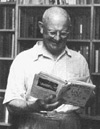P.G.Wodehouse A Life by Robert McCrum
At the onset of the Second World War, Wodehouse was living in France as a tax exile. Being profoundly uninterested in world affairs and politics, he failed to realise the danger of staying where he was until it was too late. In 1940, aged 60, he was interned, first in Belgium, then in Poland, in Upper Silesia. (His comment on this was: 'If this is Upper Silesia, I dread to think what Lower Silesia is like.')
After a year he was released and persuaded by the Nazis to make a series of broadcasts - light, witty reflections on his internment and his fellow-internees - which were aimed at his American public but, of course, broadcast in England as well, where they were not well-received. He was branded a collaborationist, even a traitor, and as a result was never able to return to England where he continued to be in bad odour politically. None of this, of course, prevented his books and plays from being hugely popular both here, in America and, indeed, worldwide.
Belatedly, at age 93 he was knighted and died, aged 95, at his home in Long Island in 1975.
There are several possible interpretations of Wodehouse's motives for making the war-time broadcasts, the most feasible being that he was 'an innocent abroad'. He was a profoundly un-political person and would probably not have understood the impact that simply making broadcasts under the aeigis of the Nazis, however apparently innocuous the content, would have had in war-time Britain. All his life, Wodehouse was obsessed, and possessed, entirely by his writing and the proof of this single-minded dedication is in his vast output in the form of novels, short stories, essays and plays.


1 comment:
You couldn't have a Wodehousian sense of humor and be a Nazi sympathizer at the same time. It can't be done. Digging around for a 'dark side' of this jolly good fellow is a joke in itself... and not a funny one either.
Post a Comment